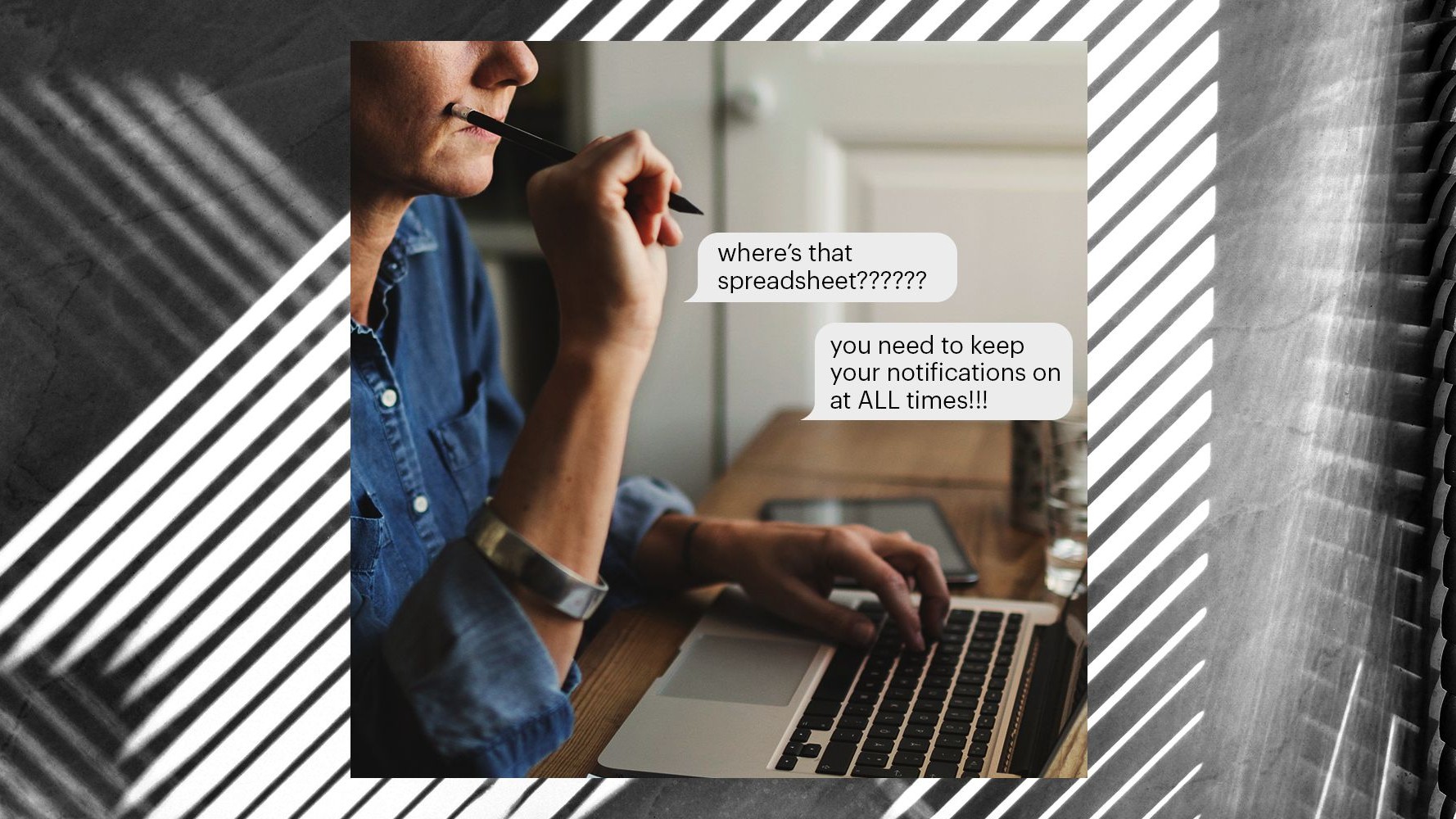When Working From Home Becomes a Never-Ending Nightmare
More and more women are reporting instances of workplace bullying by managers as a direct result of ongoing WFH mandates.

An employee at a global recruitment company in Sydney, Australia, Catriona* was relieved when she maintained her role in the face of pandemic-related mass layoffs. At 33, she'd worked her way up the corporate ladder, landing as the head of a sales team. Then, everything went sour when working from home led to systematic, ongoing bullying from her manager.
"My manager keeps sending emails that ask me what I’m doing and to list every task,” she says. “Until I began working from home, she'd never done this, but now she is asking to join my Zoom meetings to observe my interactions with clients, which is making me really anxious, and it's weird for my clients," Catriona tells Marie Claire.
"Even worse, she's accused me of lazing around at home. One morning, I logged in at 9:15 a.m. and she immediately asked me why I was logging in late then sent a group email demanding that we all be online before 9 a.m. to start work. Typically, in the office, we start at 9:15 a.m., and even then, we're usually having a coffee and settling in for the day."
It's been a year since COVID-19 reshaped the working world for many professionals. For employees accustomed to being in an office environment, the shift to working remotely seemed a small sacrifice to make to keep their jobs in the face of a looming economic recession. For some, working from home was—and remains—a dream come true; there are no long commutes through snarling traffic or battles to find parking near the office.
But for others, working from home has become a nightmare. Excessively critical managers, bosses who take out their fury and frustration on workers, and the constant fear of losing an income have turned into a pandemic of another type: bullying.
Because of WFH circumstances, employers are faced with a fundamental change in their means of supervising and communicating with employees, and the misuse of digital tools to influence and control can seem invasive and intimidating to workers when implemented without sensitivity or justification. Some businesses have no evident structure to report bullying or harassment in the absence of physical witnesses. And new employees, temp employees, or contractors can be particularly vulnerable without the sense of community an office space can foster.
Anya*, 36, lost her role in HR just prior to the first lockdown in Melbourne. When an ex-colleague suggested she join his consultancy business, it had seemed like an ideal situation: ensuring she had an income to care for herself and her teenage daughter. Her Bulgarian passport meant that she wasn't eligible for any government support, and there was rent to pay. Then the texts began.
Get exclusive access to fashion and beauty trends, hot-off-the-press celebrity news, and more.
"You need to come into the office tomorrow" one 11:30 p.m. message read. (At the time, only essential workers were supposed to be in the workplace.) The manager who'd been responsible for Anya's orientation texted at 2 a.m. one morning, "You might be [the boss's] friend, but you're not qualified for this role. We don't need you here." Within two weeks, having done hours of online administration work for the company from home, Anya received a phone call: "You've been nothing but difficult from the beginning. You haven't come in when we asked, you're unqualified. We won't need you," Anya remembers. The company claimed the hours of work she'd done had not fulfilled the task and refused to pay her.
"I've worked in HR for a decade now, so I know how good some employers are about handling sexual abuse, bullying, and mismanagement," she tells Marie Claire. "Even being an expert doesn't make you immune to bullying, though."
A survey of 229 human resources departments in the U.S. showed that approximately one-half of the companies had more than 80 percent of their employees working from home from March to May 2020 because of the COVID-19 pandemic. The survey also predicted a long-term, increased proclivity for remote work after the pandemic. The rise in working from home is likely to mean greater demand from employers that surveillance measures (e.g. facial recognition hardware, cameras, video calls) are installed to ensure workers are completing their tasks and adhering to set office hours. At what point does supervision turn into exploitation or abuse? When does Zoom become invasive rather than a means of connecting with colleagues?
Jessica Hickman was working in management in the UK for five years before she came to Australia in 2013 to work on a large oil and gas project in rural Darwin.
She was in charge of People and Culture, but as she became more successful, she was bullied even more by the Head of HR. “I suffered burnout to the extent that I ended up in [the] hospital. Soon after I recovered [in 2017], I launched Bullyology.” Bullyology now runs training programs and workshops to address toxic workplace cultures globally.
Hickman notes that there's been a 70 percent increase in reports of bullying since March 2020. She cites the pressures associated with the current lack of job security, being expected to work structured hours while also worrying about childcare, having no clear lunch breaks, and "Zoom fatigue" as reason people are more prone to bullying others or being bullied themselves.
“Roles are really blurred and there [are] no clear processes for working remotely. People are vulnerable [and] bullies operate on power and control,” Hickman says.
Serena*, 42, works in communications for a global health care organization based in Melbourne. Since being required to work from home last March, she's found that the balance between work and personal life has become so blurred, it's almost impossible to feel like she can relax.
Roles are really blurred and there are no clear processes for working remotely. People are vulnerable [and] bullies operate on power and control.
"I am expected to be on call every hour of the day. I’m exhausted," she admits. "My manager is questioning each of my team [members] about the rest of the team. She's asking whether we are talking to each other and what we're saying. Her behavior is demonstrating a real lack of trust, and it's making me question whether I can trust my colleagues."
Serena says she has been humiliated by her manager on group Zoom calls, which is even more stressful considering her workload has doubled during the pandemic. "I needed to visit a doctor last month and my manager's response was that I had a one-hour limit to see the doctor and get back online. She added that I should 'suck it up' and stop moaning when I suggested I needed some help with my workload."
COVID-19 has raised the risk of job burnout and chronic stress syndrome, inflicting constant feelings of exhaustion and disinterest in work. Partnered with the non-stop media exposure to stories of death, destruction, and doom, the stage seems well set for those under stress to behave in ways otherwise unconscionable within a traditional workplace environment.
“Without all the cues, it’s easy to make assumptions about what people are saying or doing,” says Robyn A. Berkley, Professor of Management at Southern Illinois University, who has been investigating perceptions of harassment in a digital environment for the past 17 years. “Because it’s physically and emotionally removed, harassers engage in abuse because they can close their email, shut down Zoom and feel disconnected as if they don’t need to deal with consequences while there isn’t the threat of that victim in front of them.”
Hickman left her workplace in 2016. She says she still breaks out in a rash when discussing the bullying and how lonely and exhausted she felt, especially when distant from her family and friends. "I spent three years in fight-or-flight mode, which impacted my diet, my sleep, and my weight... When someone is so physically, emotionally, and mentally damaged, it is hard for them to work in any organization. I'm lucky I sought out therapy and support, but it took time to be prepared to run my business and return to working."
*Last names have been removed to protect sources' privacy.
Related Story

Related Story

